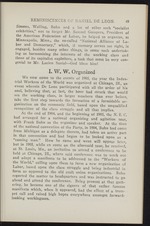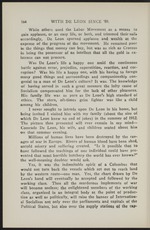| 1 |
 |
“...OF DANIEL DE LEON. 49
Simons, Walling, Bohn and a lot of other such socialist
celebrities, not to forget Mr. Samuel Goinpers, President of
the American Federation of Labor, he helped to organize, at
Minneapolis, Minn., the so-called "National Alliance of La-
bor and Democracy, which, if memory serves me right, is
engaged, besides many other things, in some such undertak-
ing as harmonizing the interests of the working class and
those of its capitalist exploiters, a task that must be very con-
genial to Mr. Lucien SanialGod bless him!
I. VV. W. Organized
We now come to the events of 1905, the year the Indus-
trial Workers of the World was organized at Chicago, 111., an
event wherein De Leon participated with all the ardor of his
soul, believing that, at last, the hour had struck that would
see the working class, in larger numbers than ever before,
take the first step towards the formation of a formidable or-
ganization on the economic field, based upon the unqualified
reco,gnition of the...”
|
|
| 2 |
 |
“...accordingly, De Leon spurned applause and wealth at the
expense of the progress of the movement. He remained poor
in the things that money can buy, but was as rich as Croesus
in being the possessor of an intellect that all the gold in ex-
istence can not procure.
Was De Leons life a happy one amid the continuous
battle against error, prejudice, superstition, reaction, and cor-
ruption? Was his life a happy one, with bis having to forego
many good things and surroundings and companionship con-
genial to a man of De Leons culture? It was. The knowledge
of having served in such a great measure the lofty cause of
Socialism compensated him for the lack of other pleasures.
His family life was as pure as De Leons high standard of
ethics. The stern, oft-times grim fighter was like a child
among his children.
I never sought to intrude upon De Leon in his home, but
being invited I visited him with my family (about the size of
which De Leon knew no end of jokes) in the summer of 1912.
The picture then...”
|
|
